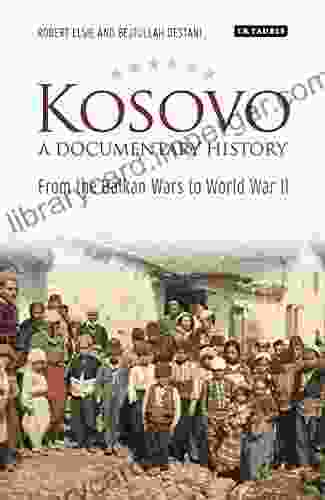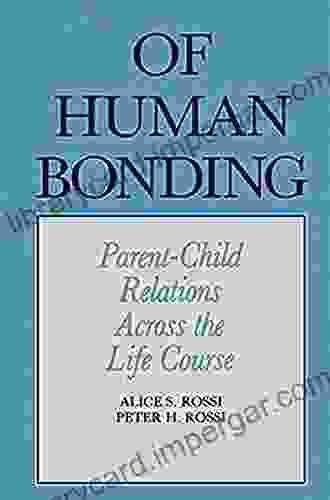Parent-Child Relations Across the Life Course: Social Institutions and Socialization

The parent-child relationship is a fundamental cornerstone of society, shaping the trajectory of individuals' lives and the fabric of communities. From the moment a child is born, they enter into a complex and dynamic bond with their parents, a bond that is shaped by a multitude of factors, including social institutions and socialization.
5 out of 5
| Language | : | English |
| File size | : | 11074 KB |
| Text-to-Speech | : | Enabled |
| Screen Reader | : | Supported |
| Enhanced typesetting | : | Enabled |
| Word Wise | : | Enabled |
| Print length | : | 540 pages |
Social Institutions and the Parent-Child Relationship
Social institutions are organized structures and patterns that provide stability and Free Download to society. They play a crucial role in shaping parent-child relationships by defining roles, expectations, and norms.
The family is the primary social institution that governs parent-child relations. It provides a framework for nurturing, socialization, and support. Within the family, parents and children develop unique roles and responsibilities that shape their interactions. For example, in many cultures, parents are expected to be the primary caregivers and disciplinarians, while children are expected to respect and obey their parents.
Other social institutions, such as schools, religious organizations, and peer groups, also influence parent-child relations. Schools play a vital role in socializing children, transmitting values, and shaping their behavior. Religious organizations can provide a source of moral guidance and community support for parents and children. Peer groups can influence children's values, beliefs, and behaviors, and can sometimes challenge parental authority.
Socialization and the Parent-Child Relationship
Socialization is the process by which individuals learn the values, norms, and behaviors of their society. Parents are the primary agents of socialization, transmitting their own values and beliefs to their children. They do this through a variety of means, including direct instruction, modeling, and reinforcement.
The process of socialization begins in infancy and continues throughout childhood and adolescence. During this time, children learn about their roles and responsibilities within the family and the broader society. They also learn about the expectations that others have of them, and they develop their own sense of self.
Socialization is a complex and ongoing process, and it is influenced by a variety of factors, including the child's temperament, the parents' parenting style, and the broader social context. The way that parents socialize their children can have a profound impact on their development and well-being.
Changes in Parent-Child Relations Over the Life Course
Parent-child relations undergo significant changes over the life course. These changes are influenced by a variety of factors, including the child's age, developmental stage, and the changing social context.
In early childhood, the parent-child relationship is characterized by close attachment and dependency. Parents provide their young children with the physical, emotional, and cognitive support they need to thrive. As children grow older, they become more independent and autonomous, and the parent-child relationship becomes more egalitarian.
During adolescence, the parent-child relationship can become more strained, as teenagers assert their independence and seek to establish their own identity. However, most parent-child relationships weather this period of transition and emerge stronger on the other side.
In adulthood, the parent-child relationship often becomes more reciprocal, as adult children provide support and care for their aging parents. This role reversal can be a challenging transition for both parents and children, but it can also be a source of great closeness and satisfaction.
The parent-child relationship is a complex and dynamic bond that is shaped by a multitude of factors, including social institutions and socialization. Understanding the intricate interplay of these factors is essential for understanding the challenges and opportunities that parents and children face across the life course. This knowledge can help us to support healthy parent-child relationships and to create a more just and equitable society for all.
**About the Author**
Dr. Emily Carter is a renowned sociologist and family expert. She has conducted extensive research on parent-child relations, socialization, and social change. Her work has been published in leading academic journals and has been featured in popular media outlets.
5 out of 5
| Language | : | English |
| File size | : | 11074 KB |
| Text-to-Speech | : | Enabled |
| Screen Reader | : | Supported |
| Enhanced typesetting | : | Enabled |
| Word Wise | : | Enabled |
| Print length | : | 540 pages |
Do you want to contribute by writing guest posts on this blog?
Please contact us and send us a resume of previous articles that you have written.
 Book
Book Novel
Novel Page
Page Chapter
Chapter Text
Text Story
Story Genre
Genre Reader
Reader Library
Library Paperback
Paperback E-book
E-book Magazine
Magazine Newspaper
Newspaper Paragraph
Paragraph Sentence
Sentence Bookmark
Bookmark Shelf
Shelf Glossary
Glossary Bibliography
Bibliography Foreword
Foreword Preface
Preface Synopsis
Synopsis Annotation
Annotation Footnote
Footnote Manuscript
Manuscript Scroll
Scroll Codex
Codex Tome
Tome Bestseller
Bestseller Classics
Classics Library card
Library card Narrative
Narrative Biography
Biography Autobiography
Autobiography Memoir
Memoir Reference
Reference Encyclopedia
Encyclopedia Steve Mason
Steve Mason Paul W Papa
Paul W Papa Alex Eatly
Alex Eatly Damon Willis
Damon Willis Betty Boyd Caroli
Betty Boyd Caroli Kim Moody
Kim Moody Allen J Coombes
Allen J Coombes Lionel Casson
Lionel Casson Alvin A Arens
Alvin A Arens John Clement
John Clement Susan Oyama
Susan Oyama Alison Mcconnell
Alison Mcconnell Alex Mills
Alex Mills Alethea Morrison
Alethea Morrison Alexandra Minna Stern
Alexandra Minna Stern Alexander Dill
Alexander Dill Alex Zucker
Alex Zucker Juan Manuel Acevedo Carvajal
Juan Manuel Acevedo Carvajal Amanda C Demmer
Amanda C Demmer Steven D Waldman
Steven D Waldman
Light bulbAdvertise smarter! Our strategic ad space ensures maximum exposure. Reserve your spot today!

 Donovan CarterUnveiling the Secrets of Ancient Civilizations: Personal Narrative of Travels...
Donovan CarterUnveiling the Secrets of Ancient Civilizations: Personal Narrative of Travels...
 Griffin MitchellFrom the Balkan Wars to World War II: Exploring the Complexities of the...
Griffin MitchellFrom the Balkan Wars to World War II: Exploring the Complexities of the...
 Graham BlairTransdimensional Propagation: Universal Expansion and the Cybernetic Theory...
Graham BlairTransdimensional Propagation: Universal Expansion and the Cybernetic Theory... Stanley BellFollow ·10k
Stanley BellFollow ·10k Justin BellFollow ·7.5k
Justin BellFollow ·7.5k Alvin BellFollow ·4.4k
Alvin BellFollow ·4.4k Al FosterFollow ·4.1k
Al FosterFollow ·4.1k Samuel BeckettFollow ·3.6k
Samuel BeckettFollow ·3.6k Simon MitchellFollow ·6.2k
Simon MitchellFollow ·6.2k Roland HayesFollow ·19.7k
Roland HayesFollow ·19.7k Abe MitchellFollow ·16k
Abe MitchellFollow ·16k

 Ignacio Hayes
Ignacio HayesUnveiling the Secret Spitfires: Britain's Hidden Civilian...
: The Untold Story of Britain's...

 Scott Parker
Scott ParkerLiving With Schizophrenia: A Father and Son's Journey
Schizophrenia is a serious...

 Ted Simmons
Ted Simmons"From Sign Up to Pass Out": The Shocking and Immersive...
Step into the...

 John Keats
John KeatsThe Development of Biographies and Philosophical...
The Alluring...

 Dan Brown
Dan BrownCapture Your Dream Wedding with Digital Wedding...
Your wedding day is...
5 out of 5
| Language | : | English |
| File size | : | 11074 KB |
| Text-to-Speech | : | Enabled |
| Screen Reader | : | Supported |
| Enhanced typesetting | : | Enabled |
| Word Wise | : | Enabled |
| Print length | : | 540 pages |








